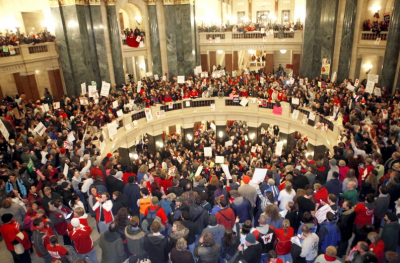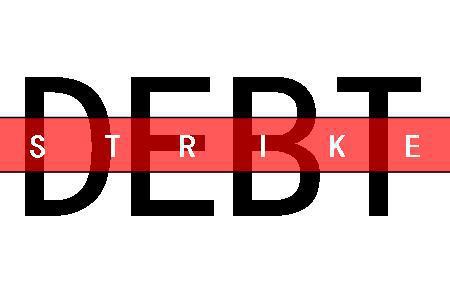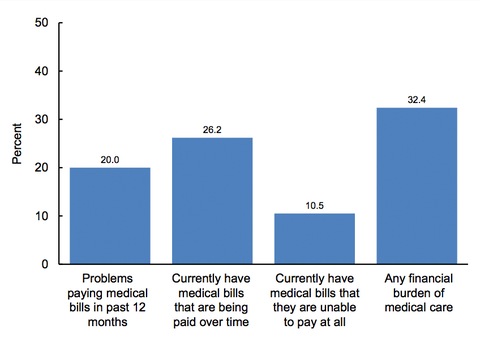In the last few days, a coup at the University of Virginia (UVa) and a report on the mass exploitation of the part-time academic workforce have made it clear that the US university system has come apart at top and bottom. All that’s left is the middle, endlessly putting itself into debt to stay in these increasingly dysfunctional institutions. Welcome to the garbage can university. There’s garbage at the top, rubbish pay at the bottom, and people treated like garbage in-between. And the masterwork of the new Interim President at UVa is on, yes, garbage cans.
First, UVa. This is unbelievable, even by the messed-up standards of university administration. Out of a clear blue sky the Board of Visitors (i.e. the Trustees) simply fired the current President Teresa Sullivan. The email trail dug up by student journalists at The Cavalier Daily, and pursued by the online daily Inside Higher Ed, shows what was up. Board members were so taken by a mediocre Wall Street Journal piece of hype about online courses that they felt they had to expedite removing Sullivan. Here’s what got them salivating:
Online education will lead to the substitution of technology (which is cheap) for labor (which is expensive)—as has happened in every other industry—making schools much more productive.
The sleight-of-hand that will not have escaped your attention is to transform education, which is a public good, into a private industry. Rather than create a well-informed citizenry, this manufacture can be quantifiably more “productive.”
Perhaps most telling is what the Board did next. Sullivan, an expert on work and debt, was replaced with the Dean of the Business School. What use could a university have for the author of As We Forgive our Debtors : Bankruptcy and Consumer Credit in America? Or The Fragile Middle Class : Americans in Debt? Interim President Carl Zeithaml, former dean of the McIntire School of Commerce, is the third author of Barriers to Corporate Growth (1981). That really tells you all you need to know. Except that Zeithaml wouldn’t make tenure in most places with that publication record. Oh, I’m sorry, I forgot his recent essay “Garbage Cans and Advancing Hypercompetition.” My mistake. What could possibly better summarize the current American university than that?
At the other end of the academic pay scale, we learned today from the Coalition on the Academic Workplace that the neo-liberal revolution has fully succeeded. Composed of 26 scholarly societies like the College Art Association, the American Academy of Religion, and the Modern Language Association, the Coalition began from this starting point:
According to data from the United States Department of Education’s 2009 Fall Staff Survey, of the nearly 1.8 million faculty members and instructors who made up the 2009 instructional workforce in degree-granting two- and four-year institutions of higher education in the United States, more than 1.3 million (75.5%) were employed in contingent positions off the tenure track.
Rightly, the Coalition saw its responsibility as trying to learn more about the conditions of these workers. Their survey received over 30,000 responses, with 20,000 from self-identified part-time faculty/instructors. The conclusions are stark:
◆ The median pay per course, standardized to a three-credit course, was $2,700 in fall 2010 and ranged in the aggregate from a low of $2,235 at two-year colleges to a high of $3,400 at four-year doctoral or research universities.
◆ Part-time faculty respondents saw little, if any, wage premium based on their credentials.
◆ Professional support for part-time faculty members’ work outside the classroom and inclusion in academic decision making was minimal.
◆ Part-time teaching is not necessarily temporary employment, and those teaching part-time do not necessarily prefer a part-time to a full-time position. Over 80% of respondents reported teaching part-time for more than three years, and over half for more than six years.
It is in this context that we need to discuss the assertion that labor costs are too high at US universities. It is in this context of systematic impoverishment of part-time faculty and instructors that students and those who support them should discuss the value of the tuition being paid for these courses, which now amounts to over $40,000 per year at all the top-ranked private institutions.
The disgrace of all this has been realized in Quebec. CLASSÉ point out that state support for public universities has fallen from 87% of the budget to 71%. That’s a level no US public institution can now dream of receiving. And that’s why they are on strike: because they can see where they are going–a world of essays on garbage cans, garbage level pay and garbage universities. And they want none of it.














